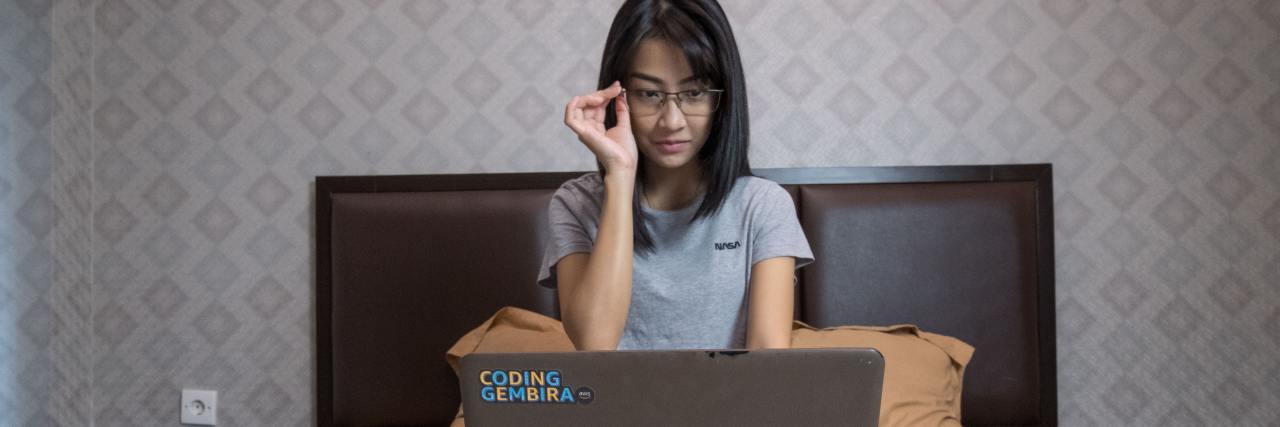We are closing in on a full year of navigating the coronavirus (COVID-19) pandemic, which has impacted many people’s mental health in various ways: grieving the loss of loved ones, not coping well with isolation, fear of catching the virus, financial anxiety and more. Seeing the largely negative effect the pandemic has had on the world around me has brought on a lot of guilt over the fact that the past year has been pretty good for me, mental health-wise. Here are some ways living through this pandemic has helped me keep my bipolar disorder episodes in check:
1. Lots of regular sleep.
Working from home and essentially not having to do anything else means I get to sleep a lot. I don’t have to get up early to commute to work, I have no other commitments past 5 p.m., and I am generally pretty bored. As a result, I have a more sufficient and more regular sleep schedule than ever before. Lack of sleep is a very common trigger for manic or hypomanic episodes, and my current circumstances make it easy to avoid that particular trigger.
2. A solid routine.
My previously full and exciting life has essentially been reduced to working from home and cycling through the same three or four leisure activities. All my days look the same. Routine is an important part of maintaining stability with bipolar disorder, and the lack of variety in my day-to-day life has helped me in another important way: I no longer forget to take my medication. Before the pandemic, it often slipped my mind because I was caught up in some captivating activity, or I would find myself in a theatre and have to turn off my phone, thus missing my reminder alarm. Now, there are no distractions at my scheduled medication time. I have heard that medications can be more effective if you take them at the same time every day, and based on my current experience, I can definitely say I believe it.
3. Many of my triggers are not a part of my life right now.
I work in the live arts, an industry that has remained almost completely shut down through all of this. I live a very understimulating life compared to before. A difficult realization I’ve had in the past year is that a lot of aspects of the life I used to lead were really bad for me and actively kept me unwell. I love being a part of my artistic community, but participating in its culture meant a lot of late nights out, often consuming alcohol, inconsistent schedules and high stress… all of which are not great for people with bipolar disorder who are trying to avoid future episodes. I did love that life though, and it’s unlikely that I would have walked away from it willingly, but the pandemic forced me out temporarily. I am aware I will have some interesting choices to make if and when the art scene comes back to life.
4. More understanding from the average person.
I don’t like seeing other people suffer, but I have to say I have found a strange comfort in seeing non-mentally-ill people go through the experience of realizing how precarious their circumstances are, how everything they have devoted years to build can be lost in a heartbeat. This was new to them, but has always been my reality as a person with bipolar disorder who has practically had to rebuild my life from scratch after every episode. I feel a certain understanding that wasn’t there before, and I don’t know that I’m prepared to lose that understanding once others get to carry on as they were while I continue to fear the very real possibility of losing everything I have, again.
I am by no means saying this pandemic is a good thing. It is not. People are literally dying. I know I am lucky: I got to keep my job and work remotely this whole time, I live with my favorite people in the world so I’m not starved for social contact, I have not lost anyone, and I am as healthy as I can be with a lifelong incurable mental illness. The pandemic didn’t grant me stability — it simply forced certain lifestyle changes upon me, and those changes are the ones that have kept me stable. I am not grateful for the pandemic. What I am grateful for is that I haven’t had to go through a mental health crisis and a global pandemic simultaneously. I am grateful that my bipolar brain survived the hit, thrived even. But for everyone’s sake, I do hope this ends.
Photo by Marga Santoso on Unsplash

